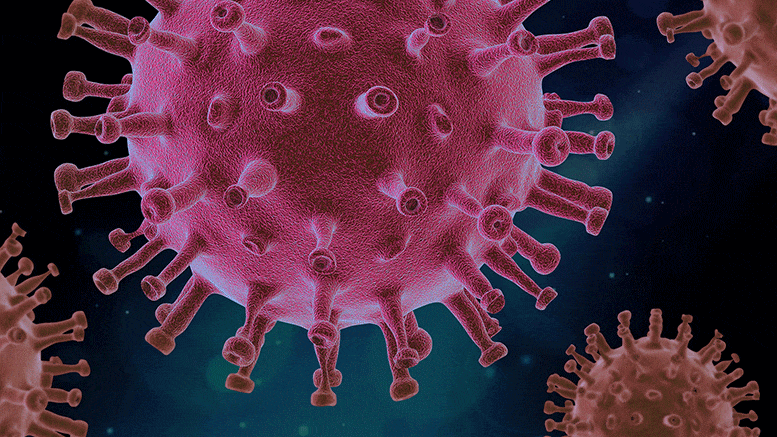Spike Protein Docking Site Is Achilles’ Heel of the Coronavirus
0 View
Share this Video
- Publish Date:
- 16 September, 2021
- Category:
- Covid
- Video License
- Standard License
- Imported From:
- Youtube
Tags

According to a MedUni Vienna research team led by allergist and immunologist Rudolf Valenta of the Center for Pathophysiology, Infectiology and Immunology, about 20% of those who have recovered from Covid-19 do not develop immune protection against SARS-CoV-2. Their research found that the crucial immune defense that prevents the virus from attaching itself and entering body cells only occurs when a person is able to form specific antibodies against the folded receptor binding domain (RBD) of the spike protein. This docking site does not change significantly with mutations of the virus. However, some people cannot do this for various reasons. An antigen-based vaccine targeting RBD could provide a solution, but such a vaccine is not yet available. The study is published in the leading journal Allergy.
A year ago, a research team led by research directors Rudolf Valenta and Winfried F. Pickl of MedUni Vienna’s Center for Pathophysiology, Infectiology and Immunology examined the immune status of a first cohort of patients who had recovered from a mild course of COVID-19. One of the findings at the time was that a significant proportion of infected patients were unable to form protective antibodies against SARS-CoV-2.
In the recently published follow-up study, Valenta and his team analyzed the antibody response of a larger cohort after mild and severe SARS-CoV-2 infection. The study used microarray (chip) technology developed at MedUni Vienna, where a large number of viral antigens are applied to a microscopic chip by a robot spotting machine. In addition, overlapping protein fragments (peptides) of these viral antigens were fixed on the chip, covering the entire spike protein on which the receptor binding domain (RBD) is located. This is the domain through which the SARS-CoV-2 virus binds to the ACE2 receptor of human cells.
The researchers expected an immune response to the peptides, but antibodies were formed exclusively against the intact, three-dimensionally folded spike protein. Proteins get their three-dimensional shape through the physically induced process of protein folding. It now appears that the SARS-CoV-2 virus needs the three-dimensionally folded protein to attach to the body’s cells. Only an antibody response to the folded protein, but not to parts of it, protects against infection.
This leads to one important conclusion: high antibody levels against the folded spike protein, and especially against the RBD it contains, prevent the virus from binding to human cells. However, if a person cannot form antibodies against the folded RBD, that person is not well protected. The researchers also showed that only the folded RBD, but not the unfolded RBD, generates immune protection upon immunization. Since the genetic vaccines currently in use mimic infection, it is possible that breakthroughs in vaccination could be explained by failure to develop antibodies to folded RBD.
In summary, it can thus be concluded that people who form sufficient antibodies against folded RBD are protected against SARS-CoV-2 infections. These antibodies are easily measurable in the blood with neutralization tests. Unfortunately, 20% of those who have recovered from Covid-19 – and probably those who have been vaccinated – fail to make these antibodies. Valenta explains: “We urgently need to develop an RBD-based antigen vaccine designed to overcome the non-reactivity of RBD. This vaccine would be very effective in inducing RBD-specific and thus neutralizing antibodies, the levels of which could be kept high by booster vaccinations. In this way, we could also exploit the “Achilles heel” of the virus, whose docking site does not change significantly with mutations, Valenta adds.
Reference: “Neutralization of SARS-CoV-2 Requires Antibodies to Conformational Receptor Binding Domain Epitopes” by Pia Gattinger, Katarzyna Niespodziana, Karin Stiasny, Sabina Sahanic, Inna Tulaeva, Kristina Borochova, Yulia Dorofeeva, Thomas Schlederer, Thomas Sonnweber, Gerhard Hofer, Renata , Bernhard Kratzer, Doris Trapin, Peter A. Tauber, Arno Rottal, Ulrike Körmöczi, Melanie Feichter, Milena Weber, Margarete Focke-Tejkl, Judith Löffler-Ragg, Bernhard Mühl, Anna Kropfmüller, Walter Keller, Frank Stolz, Rainer Henning, Ivan Tancevski, Elisabeth Puchhammer-Stöckl, Winfried F. Pickl and Rudolf Valenta, August 28, 2021, Allergy.
DOI: 10.1111/all.15066










